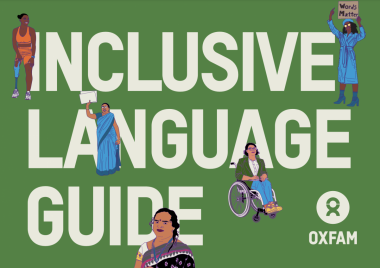Revolutionary language

If you want to change a society, the most efficient way is not with guns and tanks but with a dictionary.
Progressives know the power of language and they prioritise it in their efforts to restructure society. Change the language and you change the way people think, change the way people think and you change the way people act, change the way people act and you have changed society; all without firing a shot. It takes longer than a violent revolution but it is much more effective and longer lasting.
The establishment pursues inclusive language. The British government has several style guides about how to speak on such subjects as disability or ethnicity. Every university has its own language guide. Edinburgh University sees inclusive language as an important aspect in pursuit of its 'vision of making the world a better place'. The latest advance of the language manipulators is the 92-page Inclusive Language GuideOxfam have issued for their staff.
We can laugh at the contortions Oxfam force themselves into in order to avoid the possibility of offending any group they see as vulnerable. Former Tory minister Robert Buckland said: 'Most people will find this particular use of valuable time and resources by Oxfam totally bizarre.' Some proposed changes are beyond parody. The guide does not want employees to refer to 'headquarters' because it 'implies a power dynamic that prioritises one office over another' and 'reinforces hierarchical power issues and a top-down approach'.
However, laughing then dismissing the guide as another example of out-of-touch wokery underestimates the purpose and effect of such language. This is not bizarre, this is revolutionary and we should take it seriously. Although the Oxfam International Secretariat has fewer than 300 staff, Oxfam affiliates have around 10,000 employees and nearly 50,000 interns and volunteers in 67 countries, and 1,200 shops worldwide. Oxfam are seeking to change how people see the world.
They apologise for printing the guide in English because English is the language of a 'colonising' nation: 'We recognise that the dominance of English is one of the key issues that must be addressed in order to decolonise our ways of working and shift power.'
Oxfam's staff and volunteers have been advised to drop 'mother' and 'father' from their vocabulary and replace them with 'parent'. Oxfam argue that allowances should be made for trans families who might not identify with the conventional roles of a man and woman in parenthood.
We might think that this is merely Oxfam bending over backwards to prevent a vanishingly small group of people from feeling uncomfortable, but there is more going on here. Oxfam claim the word 'parent' describes 'the role in raising children without directly ascribing gendered roles'. They argue: 'In patriarchal culture, social norms around gender result in designated roles for parents that reflect expectations of that gender.' They object to men acting as fathers and women as mothers.
The underlying aim of these language changes is to eradicate the differences between men and women. Oxfam say: 'We are proud of using inclusive language.' But language, to be useful, has to be exclusive with definitions which help us negotiate our relationships. When we no longer speak of 'father' and 'mother' but the interchangeable 'parent' we no longer acknowledge any difference.
The words 'father' and 'mother' are meant to be exclusive, describing specific people with specific roles. Mothers are not 'breast-feeding people' or 'people who become pregnant', they are women. Take away the exclusive nature of language and we take away our ability to appreciate the differences between men and women, fathers and mothers.
Oxfam wish to avoid terms such as 'biological male/female' and 'male/female bodied'. Their staff are instructed to speak of those 'assigned female/male at birth (AFMB/AMAB)'. The reason is that no one, 'whether cisgender or transgender, gets to choose what sex they're assigned at birth'.
There is a grass-roots reaction to this push by the progressive elites to alter the way we speak and think. An 'inclusive language guide' published by the Local Government Association(LGA) was rapidly withdrawn after being pilloried by LGA workers and the public. The document included advice such as avoiding the use of the words 'Caucasian' and 'homeless'. It suggested using the expression 'welcome, everyone' instead of 'welcome, ladies and gentlemen' and 'birthing parent' rather than 'mum and dad'. I am no fan of daytime television but viewers of ITV's Good Morning Britain spoke for all of us when they expressed bemusement at the Oxfam guide.
This drive to alter how we speak should be of concern to all, but particularly to Christians. In our biblical faith, words and their precise meanings matter. Christians understand that when we lose clarity and definition we lose understanding. Would we be improving the inclusivity of Scripture if we altered the nearly 300 times 'mother' is used in the Bible to 'parent'? Altering the Lord's Prayer to speak to our 'Parent' in heaven alters its meaning in a significant way.
With imagery we lose impact when we make alterations to accord with the sensibilities of the perpetually offended. In Isaiah 1:18 we read, 'Come now, let us reason together, says the Lord: though your sins are like scarlet, they shall be as white as snow; though they are red like crimson, they shall become like wool.' The Oxfam guide would have us stop using 'white' as a term for cleanliness and purity on the (spurious) grounds that it has racial overtones. How then do we capture the clear imagery of the change brought about by redemption?
Language is too important to be left a tool in the hands of progressive ideologues in their fruitless pursuit of woke utopia.
Campbell Campbell-Jack is a retired Church of Scotland minister. He blogs at A Grain of Sand.











